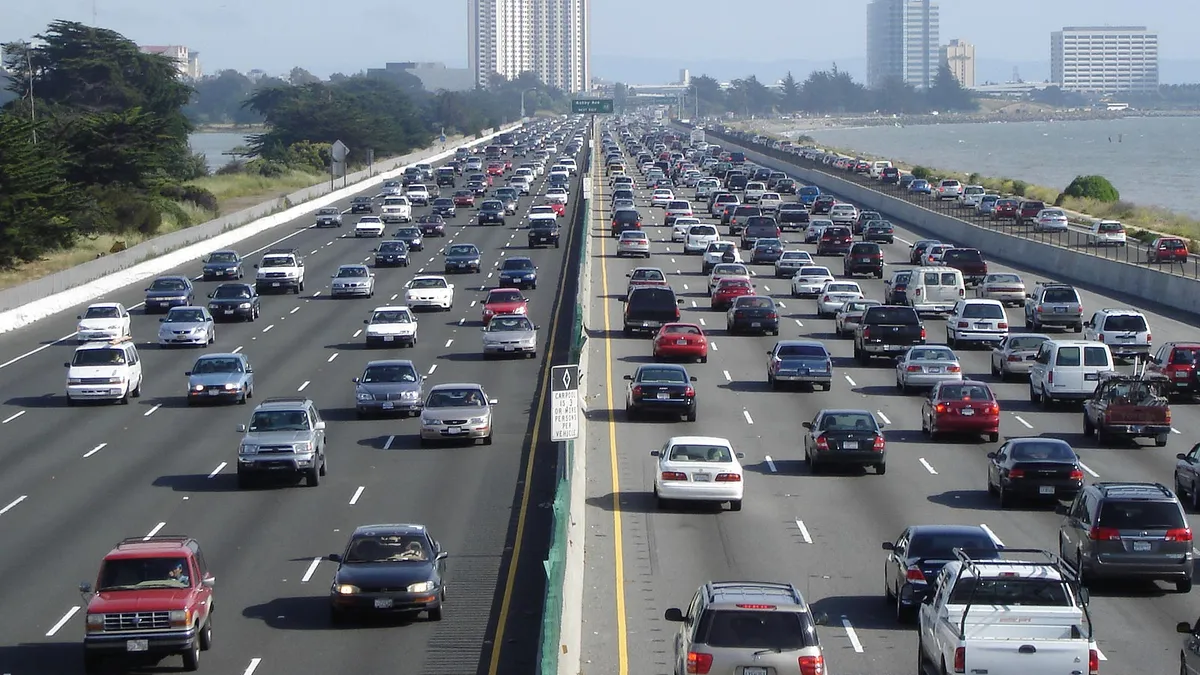UPDATE: Dec. 18, 2020: The California Public Utilities Commission (CPUC) voted on Thursday to deny two motions filed by Southern California Gas (SoCalGas) related to an ongoing investigation by the agency's Public Advocates Office into the utility's natural gas advocacy — one motion appealed an administrative law judge ruling that compelled it to turn over requested information to the office, and another sought to quash portions of a subpoena served on the utility. SoCalGas is required to turn over the information within 30 days.
Dive Brief:
- Sen. Dianne Feinstein, D-Calif., and Rep. Nanette Barragán, D-Calif., last week pressed Southern California Gas Company (SoCalGas) on reports that it has tried to undermine California's broader transition away from fossil fuels.
- In a letter to SoCalGas, the legislators referred to an ongoing investigation into the utility by the California Public Utilities Commission's Public Advocates Office (Cal Advocates), saying that documents in that investigation point to actions that "paint a clear and deeply concerning portrait of SoCalGas' attempts to systematically undermine greenhouse gas reduction targets in California."
- "California's renewable energy goals are important, and we support them," SoCalGas spokesperson Christine Detz said in an emailed response, adding that the utility looks forward to sharing this information with the lawmakers and answering their questions.
Dive Insight:
The Public Advocates Office began investigating SoCalGas' natural gas advocacy and the associated costs in 2019, after Sierra Club filed a motion with the commission saying that SoCalGas had created a group called Californians for Balanced Energy Solutions (C4BES). The group described itself as a coalition of natural and renewable natural gas users, and sought to get involved in the CPUC's proceeding on decarbonizing buildings without disclosing its relationship with the utility, according to the motion.
Cal Advocates says its investigation has found that SoCalGas was involved in numerous campaigns to promote natural gas use in California, "often using surrogates to obscure the fact that SoCalGas was responsible for these campaigns," and that the utility categorized advocacy efforts as "education" to get around laws on using ratepayer funding. The utility and its hired consultants may not have complied with state and local lobbying reporting requirements, according to Cal Advocates.
Feinstein and Barragán asked SoCalGas to provide them with information on its relationship with C4BES, how much it has invested to date in limiting greenhouse gas emissions, as well as additional context on a lawsuit it filed against California over its Advanced Clean Trucks regulation. The lawmakers also asked about the utility's action plan to achieve 100% clean energy by 2045.
Cal Advocates spokesperson Maya Chupkov said in an emailed statement that the group is happy to see the Congressional leaders demand answers from SoCalGas.
"That SoCalGas has, as the Public Advocates Office investigation has uncovered, used its customers' money to pay for this is both unethical and illegal. Californians deserve to know the truth about how their money is spent, especially if it involves funding efforts to derail California's climate policy," Chupkov added.
SoCalGas' Detz said that the utility has invested in infrastructure that provides affordable, reliable energy to 22 million people, which is, and will continue to be, "an indispensable tool in the transition to an integrated, renewable-powered energy system."
"We are transitioning our system to deliver additional clean fuels - including renewable natural gas (RNG) and hydrogen," Detz said, adding that the gas grid is already enabling new technologies like fuel cells and microgrids, as well as delivering cleaner fuels to replace diesel trucks.
Frank Maisano, an energy media consultant who works with utilities on natural gas and renewables, and who is working with SoCalGas, said in an emailed comment that the letter is "a rehash of several old, misleading articles about a dispute promoted by electrification advocates who are seeing widespread opposition to their ill-advise plan to electrify homes in California."
But Matt Vespa, staff attorney with Earthjustice, said that people are "starting to really understand how duplicitous this entity is."
Cal Advocates' investigation has also included a prolonged conflict with the utility over data requests.
In December, SoCalGas filed a motion appealing an administrative law judge's ruling compelling it to turn over information requested by the advocates, stating that the requests infringed on its First Amendment rights. The utility also filed a motion in May to quash portions of a subpoena served on it by Cal Advocates. Last week, the CPUC issued a draft resolution that would, if approved by the commission, deny the motions and direct SoCalGas to produce the information and documents that were requested by the office.
While the draft resolution's findings on SoCalGas' motions is positive, it's frustrating that it punted on sanctioning the utility for its conduct, Vespa said, adding that it shows a constant pattern of enablement.
"Now we've got a U.S. senator and a U.S. congressperson wanting accountability. We're at that level because there's been such a persistent failure to hold them accountable for so long," Vespa said.
Clarification: this story has been updated to reflect that Frank Maisano works with SoCalGas.















